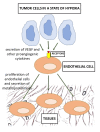Cancer Angiogenesis and Opportunity of Influence on Tumor by Changing Vascularization
- PMID: 35330327
- PMCID: PMC8954734
- DOI: 10.3390/jpm12030327
Cancer Angiogenesis and Opportunity of Influence on Tumor by Changing Vascularization
Abstract
Based on the study of recent scientific literature devoted to neovascularization and angiogenesis in malignant neoplasms, it was concluded that there are many publications on each of the problems of tumor angiogenesis and vascularization. The formation of blood vessels in a tumor and certain aspects of the prognostic value of the severity of vascularization in almost all forms of cancer are considered. Special attention is paid to the peculiarities of angiogenesis in tumors of the female reproductive system. A large number of vessels in the tumor often indicates a poor prognosis. The influence of various factors on the initiation of angiogenesis and the process itself, as well as the possibility of suppressing such signals to slow down the formation of blood vessels and thus the development of the tumor are widely studied. The results of pharmacological suppression of tumor vessel formation demonstrate a good clinical outcome but one accompanied by a large number of severe adverse side effects. Such a significant amount of studies on each of the problems of tumor vascularization indicates the increasing importance of this area of oncology. At the same time, only a very small number of works are devoted to the study of the differences in angiogenesis and number of vessels between different parts of the tumor, as well as between the primary tumor node and its metastases. The refinement of the results is still to be done. It was noted that the expression of proangiogenic factors in metastases is usually higher than in the source of metastasis, and the expression in lymphogenous metastases is higher than in hematogenous ones.
Keywords: angiogenesis; cancer; tumor; vascularization; vasculogenesis; vessels.
Conflict of interest statement
The authors declare that they have no conflict of interest. The sponsors had no role in the design, execution, interpretation, or writing of the study.
Figures


Similar articles
-
Breast cancer angiogenesis: a quantitative morphologic and Doppler imaging study.Ann Surg Oncol. 1995 May;2(3):246-51. doi: 10.1007/BF02307031. Ann Surg Oncol. 1995. PMID: 7543800
-
Pathophysiology of tumor angiogenesis and its relevance in renal cell cancer.Anticancer Res. 1999 Mar-Apr;19(2C):1557-61. Anticancer Res. 1999. PMID: 10365145 Review.
-
Vasculogenesis and angiogenesis in nonseminomatous testicular germ cell tumors.Urol Oncol. 2015 Jun;33(6):268.e17-28. doi: 10.1016/j.urolonc.2015.01.005. Epub 2015 Mar 12. Urol Oncol. 2015. PMID: 25772688 Review.
-
Assessment of intratumoral vascularization (angiogenesis) in breast cancer prognosis.Breast Cancer Res Treat. 1998;52(1-3):147-58. doi: 10.1023/a:1006123520603. Breast Cancer Res Treat. 1998. PMID: 10066079 Review.
-
Mechanisms of vascularization in murine models of primary and metastatic tumor growth.Chin J Cancer. 2016 Feb 12;35:19. doi: 10.1186/s40880-016-0083-5. Chin J Cancer. 2016. PMID: 26873579 Free PMC article. Review.
Cited by
-
Evaluation of potential biomarkers for lenvatinib plus pembrolizumab among patients with advanced endometrial cancer: results from Study 111/KEYNOTE-146.J Immunother Cancer. 2024 Jan 19;12(1):e007929. doi: 10.1136/jitc-2023-007929. J Immunother Cancer. 2024. PMID: 38242717 Free PMC article.
-
Senolytics: charting a new course or enhancing existing anti-tumor therapies?Cell Oncol (Dordr). 2025 Apr;48(2):351-371. doi: 10.1007/s13402-024-01018-5. Epub 2024 Dec 4. Cell Oncol (Dordr). 2025. PMID: 39633108 Free PMC article. Review.
-
Neutrophil extracellular traps and cannabinoids: potential in cancer metastasis.Front Oncol. 2025 Jun 17;15:1595913. doi: 10.3389/fonc.2025.1595913. eCollection 2025. Front Oncol. 2025. PMID: 40599866 Free PMC article. Review.
-
Research progress of exosomes in the angiogenesis of digestive system tumour.Discov Oncol. 2024 Feb 11;15(1):33. doi: 10.1007/s12672-024-00879-4. Discov Oncol. 2024. PMID: 38341827 Free PMC article. Review.
-
Pigment Epithelial-Derived Factor in Pancreatic and Liver Cancers-From Inflammation to Cancer.Biomedicines. 2024 Oct 4;12(10):2260. doi: 10.3390/biomedicines12102260. Biomedicines. 2024. PMID: 39457573 Free PMC article. Review.
References
Publication types
LinkOut - more resources
Full Text Sources

